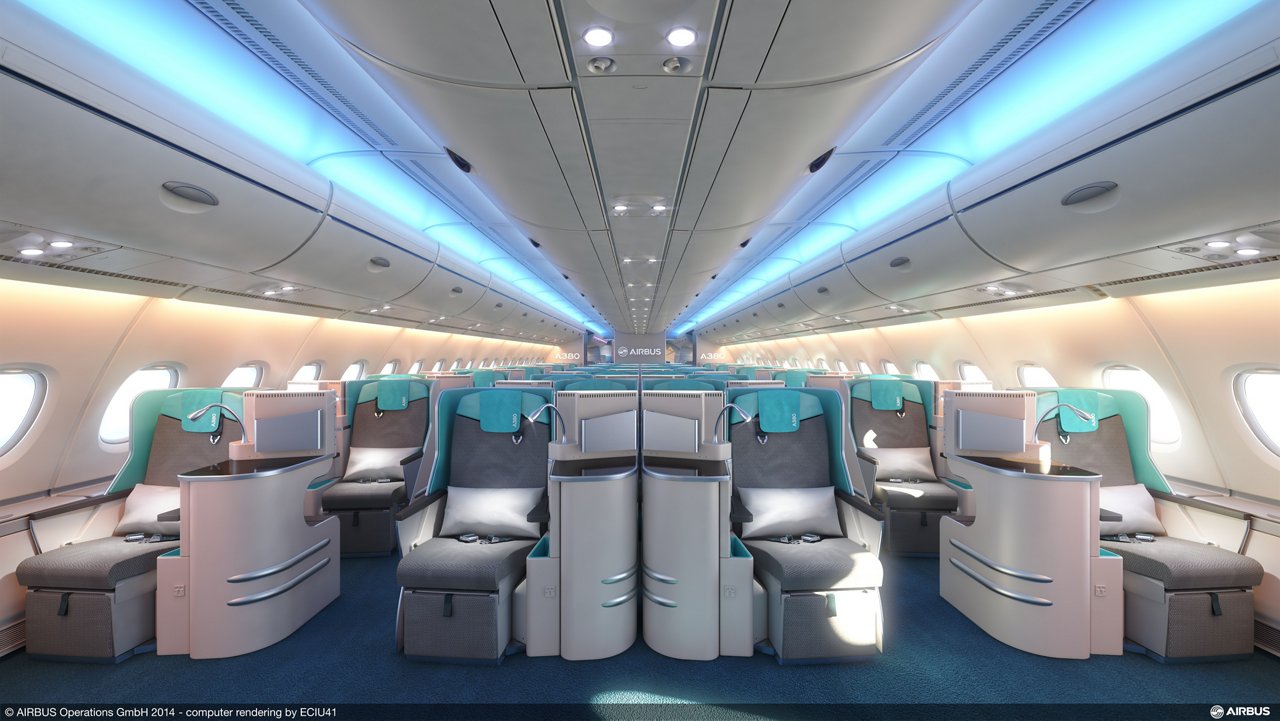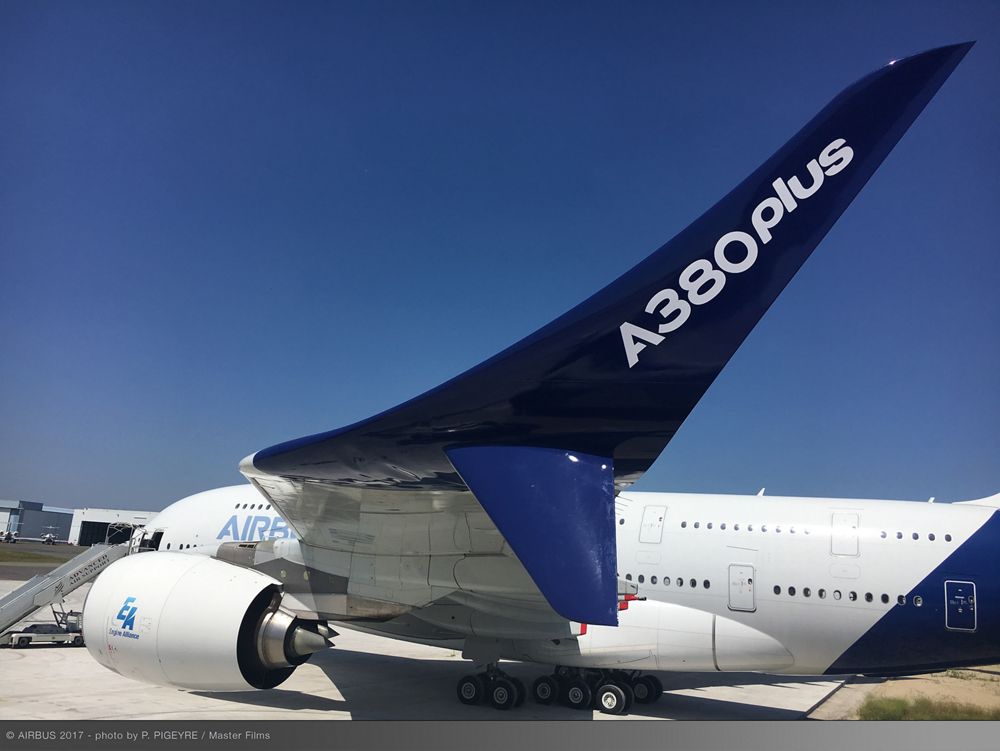
An experience to remember
There is no other aircraft in the world like it and no other
travelling experience comes close. The A380 is a modern icon that has
flown over 500,000 revenue flights carrying over 190 million passengers.
This includes more than 300 commercial flights per day, which take off
or land around the world every two minutes.
Flying with the A380 is a unique experience that introduces you to new standards of in-flight comfort, from first class to economy. As the world’s largest and most spacious passenger aircraft, its cabin allows passengers to stretch out in the widest seats in a calm and relaxing environment. With the unparalleled freedom it gives passengers to move, it’s no surprise that the A380 is the preferred choice in all cabin classes.
The double-deck A380 truly is a marvel of science and engineering, making excellent use of its space to offer passengers attainable luxury. With enough room to install stylish first-class suites, eye-catching bar or business areas, beautifully inviting cabin lighting and the quietest cabin in the sky, you will enjoy every aspect of the flight and, thanks to innovative cabin air supply technology, will arrive at your destination feeling inspired and ready to go.
Flying with the A380 is a unique experience that introduces you to new standards of in-flight comfort, from first class to economy. As the world’s largest and most spacious passenger aircraft, its cabin allows passengers to stretch out in the widest seats in a calm and relaxing environment. With the unparalleled freedom it gives passengers to move, it’s no surprise that the A380 is the preferred choice in all cabin classes.
The double-deck A380 truly is a marvel of science and engineering, making excellent use of its space to offer passengers attainable luxury. With enough room to install stylish first-class suites, eye-catching bar or business areas, beautifully inviting cabin lighting and the quietest cabin in the sky, you will enjoy every aspect of the flight and, thanks to innovative cabin air supply technology, will arrive at your destination feeling inspired and ready to go.
The double-deck A380 is the largest commercial aircraft flying
today. With air traffic continuing to double every 15 years, the A380 is
the perfect aircraft to meet the needs of the passengers of today and
tomorrow while also delivering the level of efficiency necessary to
protect the environment for future generations.
It has two full-length decks with widebody dimensions, meaning its two passenger levels offer an entire deck’s worth of additional space compared to the next largest twin-engine jetliner. With more seats than any other aircraft, the A380 offers solutions to overcrowding; needing fewer journeys to carry 60 per cent more passengers, making it the perfect solution to airport congestion, fleet plan optimization and traffic growth. Protecting our planet and ensuring we will continue to have a world full of beautiful places to visit in the future.
It has two full-length decks with widebody dimensions, meaning its two passenger levels offer an entire deck’s worth of additional space compared to the next largest twin-engine jetliner. With more seats than any other aircraft, the A380 offers solutions to overcrowding; needing fewer journeys to carry 60 per cent more passengers, making it the perfect solution to airport congestion, fleet plan optimization and traffic growth. Protecting our planet and ensuring we will continue to have a world full of beautiful places to visit in the future.

Millions of passengers around
the globe have enjoyed the one-of-a-kind flying experience offered by
Airbus’ A380, which is redefining the meaning of comfort in all classes
of service.
Combining the most advanced aviation technology and an inspired
cabin design, Airbus is proud to have created an aircraft that is
celebrated for its outstanding quality in every aspect. Leading the
industry in standards for innovation, experience and efficiency, it is
adored by passengers, pilots and crew alike.
New large winglets on the A380plus are among the aerodynamic refinements resulting in an up to a 4 per cent fuel burn savings
Even more efficient, still unique
Airbus’ development study unveiled in 2017 for an enhanced
A380 – termed the A380plus – would offer an aircraft with increased
range, greater passenger capacity, and reduced fuel usage, all while
keeping the sought-after A380 passenger experience intact.
New winglets that extend both above and below the wingtips, along with other wing refinements, improve aerodynamics and reduce drag – resulting in up to a 4 per cent fuel burn savings while still allowing the aircraft to fit within the 80 x 80-meter envelope developed from the start for the jetliner’s compatibility with airport infrastructure.
New winglets that extend both above and below the wingtips, along with other wing refinements, improve aerodynamics and reduce drag – resulting in up to a 4 per cent fuel burn savings while still allowing the aircraft to fit within the 80 x 80-meter envelope developed from the start for the jetliner’s compatibility with airport infrastructure.
A selection of “cabin enablers” offered by Airbus for A380s –
involving redesigned staircases fore and aft, a combined crew-rest
compartment and sidewall stowage removal and new seating configurations –
combine to create up to 80 additional seats with no compromise on
comfort.
The A380plus will have an increased maximum take-off weight (MTOW) of 578 tonnes, providing the flexibility of carrying the increased passenger capacity over the aircraft’s current range (8,200 nm), or flying 300 nm further. Another element of the A380plus is a modified maintenance calendar that would enable the aircraft to spend more
The A380plus will have an increased maximum take-off weight (MTOW) of 578 tonnes, providing the flexibility of carrying the increased passenger capacity over the aircraft’s current range (8,200 nm), or flying 300 nm further. Another element of the A380plus is a modified maintenance calendar that would enable the aircraft to spend more








No comments:
Post a Comment